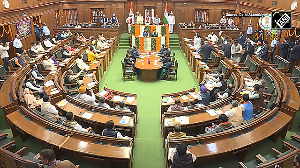 Vijaykanth on Sunday kickstarted the first major political move in Tamil Nadu, and against the ruling AIADMK, ahead of the 2016 assembly polls. But what if Jayalalithaa were to win the ‘wealth case’ ultimately? N Sathiya Moorthy explores the scenario arising from the Supreme Court's order in the Jaya case on Tuesday.
Vijaykanth on Sunday kickstarted the first major political move in Tamil Nadu, and against the ruling AIADMK, ahead of the 2016 assembly polls. But what if Jayalalithaa were to win the ‘wealth case’ ultimately? N Sathiya Moorthy explores the scenario arising from the Supreme Court's order in the Jaya case on Tuesday.
If Desiya Murpokku Dravida Kazhagam actor-politician Vijaykanth thought that he could steal ruling All India Anna Dravida Munnetra Kazhagam supremo Jayalalithaa’s limelight, it was short-lived.
In a truly landmark verdict, the three-Judge Supreme Court bench quashed Tamil Nadu’s ‘anxious’ appointment of Special Public Prosecutor in the long drawn-out ‘wealth case’ against ruling AIADMK leader and former chief minister Jayalalithaa when it had no authority to do so. If this were to be taken as the SC’s strictures against the government of the two-time ‘stop-gap’ chief minister, O Paneerselvam, trouble could be brewing for his continuance, after all.
While holding Bhavani Singh's appointment as special public prosecutor as 'bad in law', the bench headed by Justice Dipak Misra also directed Karnataka high court judge C R Kumaraswamy not to take on record his submissions during the appeals hearing on the trial court’s conviction and sentencing of Jayalalithaa and three others.
It is possibly the first time in the history of Indian democracy that the courts have held the very appointment of a PP/SPP ‘bad in law’, not owing to questions about his/her qualification or a technical reason and justification.
The bench hence ruled that the government of Karnataka, where the trial was held after the apex court had transferred the case more than a decade ago, alone had the authority to appoint a PP in the appeals stage, too.
The Supreme Court hence directed the Karnataka government’s incumbent public prosecutor to file written submissions by Tuesday, April 28.
More importantly, the court reversed the only unanimous order of the earlier two-judge Supreme Court bench that held that Opposition Dravida Munnetra Kazhagam general secretary K Anbazhagan did not have any locus standi to ‘assist the prosecution’ in the appeals, unlike as had been directed by the Supreme Court earlier.
In doing so, the bench directed Justice Kumaraswamy in the high court to accept Anbazhagan’s written submissions, not exceeding 90 pages. According to reports, Anbazhagan has since filed an 81-page submission before the court, taking the cue from the oral order of the bench, pronounced a week earlier.
In the written order, the bench bestowed greater clarity on the role of Bhavani Singh and the legality of his submissions at the appeals stage, which may have required some clarification.
In the oral order the previous week, Justice Dipak Misra had declared that Singh’s appointment was illegal, but there was no need for hearing the case afresh -- a position taken by the defence.
In the written order on Monday, the Supreme Court stuck to the oral direction, but seemingly clarified that the high court judge should not take Singh’s argument into account while pronouncing his verdict. Instead, Justice Misra, reading out the unanimous verdict of the Supreme Court bench, clarified that the high court should consider the written submissions of the Karnataka public prosecutor and DMK’s Anbazhagan.
The bench also reminded Justice Kumaraswamy that he should bear in mind the impact of corruption on the social fabric of the nation.
Jayalalithaa’s defence options at this stage are limited and sensitive. She can either seek a ‘review’ of the latest order, which by precedent would go only before the same three-judge bench.
Given that the nation has started taking a closer look than in the past years, it may not be a welcome political option for her.
Yet, that should not preclude one of her co-accused to seek a review/repeal of the order, submitting, inter alia, that they should have the ‘right to respond’ to the unilateral written submissions by the Karnataka PP and DMK’s Anbazhagan.
Better counsel could be inclined to consider challenging the present order only in an overall appeals stage to the SC -- should Justice Kumaraswamy’s verdict uphold Jaya’s conviction and/or sentence.
On the eve of the scheduled SC order, the DMDK’s Vijaykanth in a rare and unexpected move, called on DMK president M Karunanidhi and party treasurer M K Stalin, and also TMC’s G K Vasan, apart from TN Congress president E V K S Elangovan and state BJP’s Tamizhisai Soundararajan -- an extraordinary initiative, which could have no real electoral consequence for the two ‘national rivals’.
The meetings came only a day after Chief Minister Paneerselvam had called on Prime Minister Narendra Modi in New Delhi, again a rare move for him as heading the state government, flagging many of the pending state-related issues, needing quick action from the Centre.
It was also possibly the first meeting with the state Congress leadership. When TNCC president Elangovan shared space with bête noire former Union finance minister P Chidambaram, and the likes of the party’s recent popular face in actress Kushboo, looking on with relief and appreciation.
The very next day, Vijaykanth was off to Delhi, heading a delegation in which the DMK’s Kanimozhi and ‘Tiruchi’ Siva -- both Rajya Sabha members too would be participants -- along with DMK’s Thamizhi Soundararajan, for the first time under the DMDK’s aegis, to call on PM Modi.
The fact remains that even without the Jaya case order only a day later stealing the thunder, Vijayakanth’s initiative need not lead to any meaningful electoral alliance, until there is all-round greater clarity.
For one, the Congress and the BJP on the one hand, and the Congress and the TMC on the other, cannot come together, particularly in the case of the former two.
Secondly, both Stalin and Vijaykanth are chief ministerial aspirants, and the latter might feel more comfortable and convinced, working under nonagenarian Karunanidhi than working with or under Stalin.
Three, until the last word had been heard on Jaya’s case and her political future, and the first official word had been heard on the elections (the AIADMK even floated rumours of advanced polls not very long ago), Vijaykanth need not have to rush through any alliance decision at once.
However, with the Chennai meetings, Vijaykanth kickstarted the first major political move in the state, and against the ruling AIADMK, ahead of the assembly polls, scheduled not before a year.
If, however, Jayalalithaa were to win the ‘wealth case’ ultimately, then (again), it could be a different cup of politico-electoral brew in TN.
Yet, for now, it’s Jayalalithaa’s case and Jayalalithaa’s case alone. The SC having removed any precedent-linked bar on Justice Kumaraswamy from pronouncing a verdict, first orally and now in writing, the clock has started ticking -- once again, and not necessarily for the last time (there being opportunities for all sides to appeal to the Supreme Court, if unhappy with the HC verdict).
N Sathiya Moorthy, veteran journalist and political analyst, is director, Observer Research Foundation, Chennai Chapter.










 © 2025
© 2025